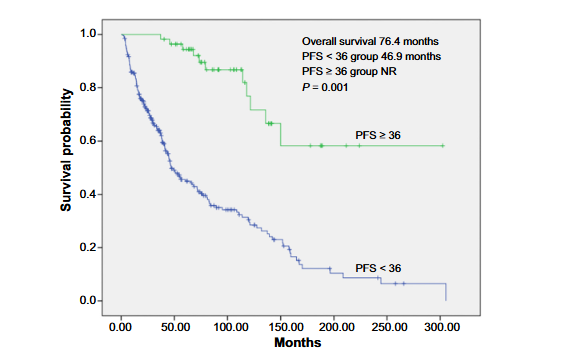Which factors help to determine the long-term response to first-line tyrosine kinase inhibitors in patients with metastatic renal cell carcinoma: A Turkish multi-centre study
DOI:
https://doi.org/10.17305/bb.2024.10512Keywords:
International Metastatic Renal Cell Carcinoma Database Consortium (IMDC) score, renal cell carcinoma (RCC), rosine kinase inhibitor (TKI), long-lasting responseAbstract
Many developing countries lack access to recommended first-line treatments for metastatic renal cell carcinoma (mRCC), such as immune checkpoint inhibitors (ICIs) or ICI-tyrosine kinase inhibitor (TKI) combinations. As a result, predictive markers are necessary to identify patients who may benefit from single-agent TKIs for long-term response. This study aims to identify such parameters. This was a multi-centre, retrospective study of patients with mRCC who were undergoing first-line treatment with sunitinib or pazopanib. Patients who had been diagnosed with mRCC and had not experienced disease progression for 36 months or more were deemed to have achieved a long-term response. Predictive clinical and pathological characteristics of patients who did not experience long-term disease progression were investigated. A total of 320 patients from four hospitals were included in the study. The median age of the patients was 60 years (range 20-89 years). According to the International Metastatic Renal Cell Carcinoma Database Consortium (IMDC) risk classification, 109 patients were classified as having favourable risk and 211 were in the intermediate-poor risk group. The median progression-free survival (PFS) and overall survival (OS) for all patients were 12.5 months and 76.4 months, respectively. In the long-term responder’s group, the median PFS was 78.4 months. Among all patients, prior nephrectomy, the Eastern Cooperative Oncology Group (ECOG) Performance Status (PS) <1, and the absence of brain metastasis were predictive factors for long-term response. For patients in the favourable risk group, the lack of brain metastasis was a predictor of long-term response. In the intermediate-poor risk group, prior nephrectomy and ECOG PS <1 were predictive factors for long-term response. Some individuals with mRCC may experience a durable response to TKIs. The likelihood of a long-term response can be determined by factors such as nephrectomy, ECOG PS < 1, and the absence of brain metastases.
Citations
Downloads

Downloads
Published
Data Availability Statement
The datasets generated and/or analyzed during the current study are available from the corresponding author on reasonable request.
Issue
Section
Categories
License
Copyright (c) 2024 Nargiz Majidova, Mustafa Seyyar, Demet Işık Bayraktar, Gülhan Dinç, Elfag İsgandarov, Javid Huseynov, Alper Yaşar, Abdussamet Çelebi, Nadiye Sever, Erkam Kocaaslan, Pınar Erel, Yeşim Ağyol, Ali Kaan Güren, Rukiye Arıkan, Selver Işık, Özlem Ercelep, Güzin Demirağ, Umut Kefeli, Osman Köstek, İbrahim Vedat Bayoğlu, Murat Sarı

This work is licensed under a Creative Commons Attribution 4.0 International License.









